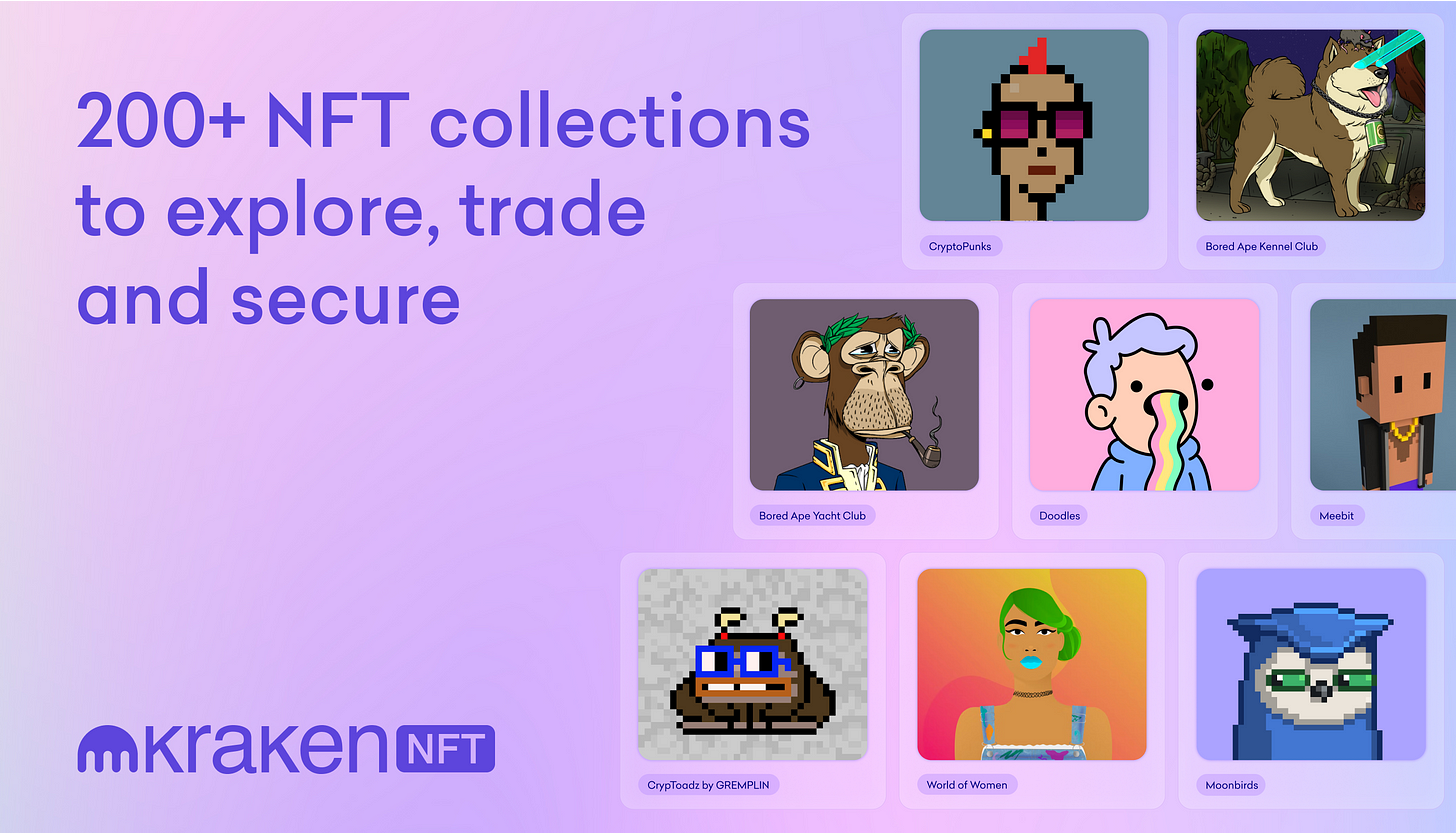Metaversal is a Bankless newsletter for weekly level-ups on NFTs, virtual worlds, & more!
Dear Bankless Nation,
“Blobspace” is an upcoming feature of Ethereum.
It’s introduced by EIP-4844, the network’s next major protocol upgrade.
But what is it, how does it work, and why’s it a big deal for NFTs?
Let’s walk through these questions for today’s post!
-WMP
🙏 Sponsor: Kraken —Kraken NFT is built for secure NFT trading ✨
Blobspace is a new blockchain-based resource market, distinct from the traditional blockspace we’re familiar with.
Instead of selling just blocks, Ethereum will soon be selling “blobs.” These blobs are essentially temporary chunks of transaction data that can be processed efficiently and flexibly.
Blobspace has its roots in Danksharding, a proposed design by Ethereum researcher Dankrad Feist that moved away from the idea of shards being multiple distinct blockchains and toward the idea of sharded data being multiple blobs within blocks.
Later a developer, protolambda, proposed a prototype of this system, which came to be called Proto-Danksharding and was later enshrined as an official upgrade proposal via EIP-4844.
Once implemented via EIP-4844, blobspace will drastically drop the gas costs and drastically improve the throughput capabilities of the Ethereum mainnet. Even still, the upgrade is transitional and paves the way to even more scaling and efficiency improvements in a later full-fledged Danksharding implementation.
We’re shipping another tool for your crypto tool belt 🎁
Claimables just launched on Bankless. What are Claimables? How much will you claim?
Blobspace introduces blob-carrying transactions. As Ethereum researcher Ben Edgington has previously put it, “EIP-4844 bolts blobs onto blocks.”
For the specifics here, an invaluable resource is the Blobspace 101 primer by Domothy. Therein he explains that actual blob data isn’t stored in transactions. Instead, it’s in a “sidecar” that’s to be checked and shared on Ethereum’s consensus layer.
Making a blob involves some serious math, but in essence:
-
You take your data and split it into small chunks 📄➗
-
These chunks are then used to create a mathematical equation 🧩➡️🔣
-
This equation is then evaluated at a specific point to create a “commitment” or a kind of unique identifier for the blob 🔍➡️🔐
-
This commitment is then processed to create a final version that the Ethereum Virtual Machine (EVM) can use 🔐➡️🖥️
Ultimately, blobs are stored for ~18 days and can be deleted after this period, yet even upon removal they can still be found through other means, like block explorers. Efficient but persistent!
Notably, blobs also have their own pricing system called “blob gas.” This is separate from Ethereum’s regular gas system and isn’t affected by mainnet congestion. Instead, the price of blob gas will be determined by how many blobs are being used at any given time.
Not only may EIP-4844 improve Ethereum’s throughput toward ~1,000 transactions per second, it’s also poised to majorly reduce the gas costs associated with using Ethereum.
That second point is huge news for Ethereum layer-two (L2) scaling solutions, as their main costs come from having to post their data to the Ethereum mainnet. Once posting this data becomes much cheaper, using L2s will become that much cheaper in kind!
Don’t get me wrong, L2s are already pretty inexpensive to use. But that’s why EIP-4844 is such a big deal, it will make L2s way cheaper than they are today.
This is fantastic for the future prospects of NFTs since the future of NFTs is, yes, on L2s (and L3s that settle to L2s, etc.). NFT-centric rollups like Zora Network, Base, and Frame are about to get way more performant, and that’s going to translate to better UX for their users since minting costs are poised to plummet.
We didn’t have ultra cheap, ultra fast transactions during the initial 2017 and 2021 NFT crazes. Will their impending arrival pave the way for a third such craze?
Perhaps, because so many more things are possible in such a paradigm. New kinds of efficiencies, new kinds of experiments, NFT apps that can offer millions of users good UX instead of hundreds.
Yet take note that blobspace won’t just make NFT transactions exponentially cheaper — it’ll also open up new design possibilities that we’ve only just begun to imagine.
For example, Pob Studio recently noted that blobspace can disintermediate platforms like Blur and OpenSea by fostering fully decentralized NFT marketplaces within the “bulletin board” space of blobs. That’s just one idea here, and there are more to come.
All in all, then, the arrival of EIP-4844 will mark a transformative shift for the entire NFT ecosystem. As we stand on the cusp of this new era, more inclusive, efficient, and innovative NFT projects are now just around the corner. Both creators and collectors should brace themselves for another renaissance in the world of NFTs accordingly!
A Bankless Citizen ⚑ turned $264 into $6,077 last year. A 22x ROI 🚀 in a bear market!
Kraken NFT is one of the most secure, easy-to-use and dynamic marketplaces available. Active and new collectors alike benefit from zero gas fees, multi-chain access, payment flexibility with fiat or 200+ cryptocurrencies, and built-in rarity rankings. Learn more at Kraken.com/nft
👉 Visit Kraken.com to learn more and open an account today.
Not financial or tax advice. This newsletter is strictly educational and is not investment advice or a solicitation to buy or sell any assets or to make any financial decisions. This newsletter is not tax advice. Talk to your accountant. Do your own research.
Disclosure. From time-to-time I may add links in this newsletter to products I use. I may receive commission if you make a purchase through one of these links. Additionally, the Bankless writers hold crypto assets. See our investment disclosures here.
- SEO Powered Content & PR Distribution. Get Amplified Today.
- PlatoData.Network Vertical Generative Ai. Empower Yourself. Access Here.
- PlatoAiStream. Web3 Intelligence. Knowledge Amplified. Access Here.
- PlatoESG. Carbon, CleanTech, Energy, Environment, Solar, Waste Management. Access Here.
- PlatoHealth. Biotech and Clinical Trials Intelligence. Access Here.
- Source: https://metaversal.banklesshq.com/p/blobspace-nfts






